You may also like
The German Association of Cities, the Global Parliament of Mayors and the international cities network ICLEI have joined forces to form a Cities Alliance to accompany the German G7 Presidency. The alliance is organising a conference on Tuesday, 3 May a U7 Mayors Summitwhich brings together high-level representatives of cities from the G7 countries. Representatives of the media are invited to follow the event virtually.
The international exchange is under the heading "Engaging the Urban World - Cities as Engines of Change for Peace, Democracy and Sustainability".. It is the most important event of cities in the framework of the German G7 Presidency. A joint declaration by the cities will also be adopted: In the „Urban7 Mayors Declaration“ the city leaders from the G7 countries will present their expectations of politics and business in order to meet the global challenges on the ground.
Participating and speaking as the German delegation will be:
- Lord Mayor Markus Lewe, Münster, President of the German Association of Cities,
- Lord Mayor Peter Kurz, Mannheim, Chairman Global Parliament of Mayors,
- State Secretary Jochen Flasbarth, Federal Ministry for Economic Cooperation and Development
- State Secretary Dr. Rolf Bösinger, Federal Ministry of Housing, Urban Development and Construction
The Mayors Round Table is also attended by city leaders from the G7 countries USA, Japan, Canada, Italy, the UK, France and the EU. Among the topics discussed at the event will be: Consequences of the war in Ukraine, role of cities in multi-level governance, impact of climate change, status of democracy, sustainable urban development, municipal development cooperation and the United Nations Global Sustainable Development Goals (SDGs). The Cities Summit is supported by the German Federal Ministry for Economic Cooperation and Development (BMZ) and the Service Agency Communities in One World (SKEW) of Engagement Global.
You will find the programme in the appendix. The event, which will last around two hours, will start at 2 p.m. on Tuesday, 3 May. You can register and follow the event virtually at this link: https://us06web.zoom.us/webinar/register/WN_9CyoaqfGQqaf2gSGtpMhKw
A press release of the German Association of Cities and its partners will also be published for the event. Further information is available on the Summit website at: https://g7u7.org/
Keywords:
DE-News, Communities, SDG 2030, City, Environmental policy
In 2017, from April to December, the following profiles of sustainable settlements were accessed most frequently in the sdg21 web database:
| Settlement | Page- calls |
||
| 01. | 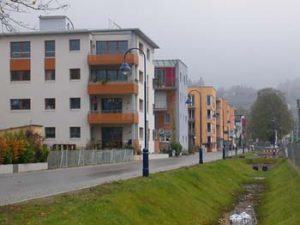 Sustainable model district Vauban Sustainable model district Vauban |
782 | |
| 02. | 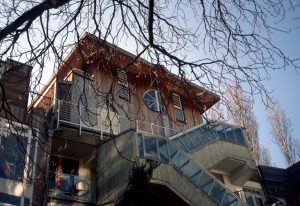 Tree houses by Frei Otto in Berlin-Tiergarten Tree houses by Frei Otto in Berlin-Tiergarten |
641 | |
| 03. | 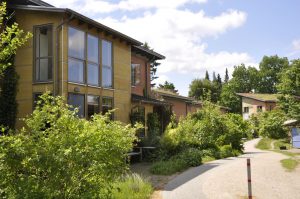 Community housing estate "Alte Gärtnerei in Kiel Community housing estate "Alte Gärtnerei in Kiel |
610 | |
| 04. |  Clay housing estate Schöneiche Clay housing estate Schöneiche |
599 | |
| 05. | 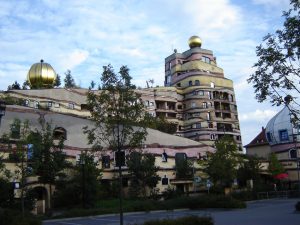 Hundertwasser House "Waldspirale Hundertwasser House "Waldspirale |
539 | |
| 06. |  Hanover-Kronsberg Hanover-Kronsberg |
495 | |
| 07. | 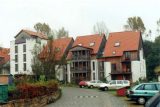 Ecological settlement Bielefeld-Waldquelle Ecological settlement Bielefeld-Waldquelle |
473 | |
| 08. |  PlusEnergyHouse "Heliotrope PlusEnergyHouse "Heliotrope |
453 | |
| 09. |  Düsseldorf-Unterbach Düsseldorf-Unterbach |
433 | |
| 10. | 429 | ||
| 11. | Signal box 60 Cologne-Nippes | 391 | |
| 12. | Energy self-sufficient solar house | 384 | |
| 13. | Cologne-Blumenberg eco-settlement | 330 | |
| 14. | Eco-settlement "Frasenweg | 289 | |
| 15. | Eco-settlement Allermöhe | 288 | |
| 16. | S.U.S.I. | 261 | |
| 17. | Moor meadow settlement Kiel-Hassee | 245 | |
| 18. | "Laher Wiesen" Hanover | 215 | |
| 19. | Anders Wohnen eG Bremen | 210 | |
| 20. | Munich-Riem Trade Fair City | 210 | |
| 21. | Ecological settlement Geroldsäcker | 210 | |
| 22. | Eco-settlement Friedrichsdorf | 199 | |
| 23. | Building Biology Settlement "Schafbrühl | 191 | |
| 24. | Farmsen trotting course | 187 | |
| 25. | Gewerbehof "Prisma" Nuremberg | 186 |
Keywords:
sdg21 news
It is estimated that the care and integration of refugees will cost 20 billion euros in 2016. In the programme Frontal21 from 24.5.2016 (from (minute 25 to 33) figures are given on how some providers of refugee accommodation charge horrendous prices. According to their research, the costs of accommodation per refugee range from 87 to 1,100 euros per month, in the extreme case of Velbert (near Wuppertal) even 1,500 euros per refugee per month.
In the contribution of the Time from 23.05.2016 costs for refugee accommodation are mentioned for various locations in Hamburg. These range from 10 to 38 euros per person per day, which corresponds to around 300 to 1,140 euros per person per month. It is interesting to note that small locations are not necessarily more expensive than large ones.
The topic of the construction costs of refugee accommodation is taken up by the German contribution to the 15th International Architecture Biennale 2016, which can be found on the website www.makingheimat.de can be seen. There are 54 different refugee buildings in the database comparing the net costs. The range of net costs is between 1,000 and 2,300 euros per m² GFA (cost group 300 - 400).
Keywords:
DE-News, Refugee shelters, News Blog Hamburg
The German Federal Ministry for Economic Affairs and Energy (BMWi) is expanding its funding for fuel cell heating systems. With immediate effect, you can apply to KfW for attractive subsidies for the installation of fuel cell heating systems in both all residential and non-residential buildings. Private individuals, freelancers, small and medium-sized enterprises (including contractors) as well as municipal and non-profit organisations are eligible to apply.
The subsidy is available for fuel cell heating systems with an electrical output of up to 5 kW that are installed either as part of a refurbishment or a new build. Depending on the electrical output, a subsidy of up to 28,200 euros per installed fuel cell is possible.
The aim of extending the funding is to establish the pioneering fuel cell technology for supplying electricity and heat in buildings on a broad market. Fuel cell heating systems are significantly more efficient than conventional combined heat and power systems. The natural gas or biogas used is utilised much more efficiently, which also leads to lower CO2 emissions.
Grant funding for fuel cell heating systems is part of the German government's "Energy Efficiency Incentive Programme". It supplements the existing KfW programmes for energy-efficient construction and renovation. Since the programme was launched in August 2016, the installation of over 900 fuel cell heating systems, primarily in detached and semi-detached houses, has been supported with grants of around 13 million euros.
All information on the product "Energy-efficient construction and renovation - fuel cell subsidy (433)" can be found at www.kfw.de/...Energieeffizient-Bauen-und-Sanieren-Zuschuss-Brennstoffzelle-(433)
Keywords:
Fuel cell, Funding, Environmental policy


